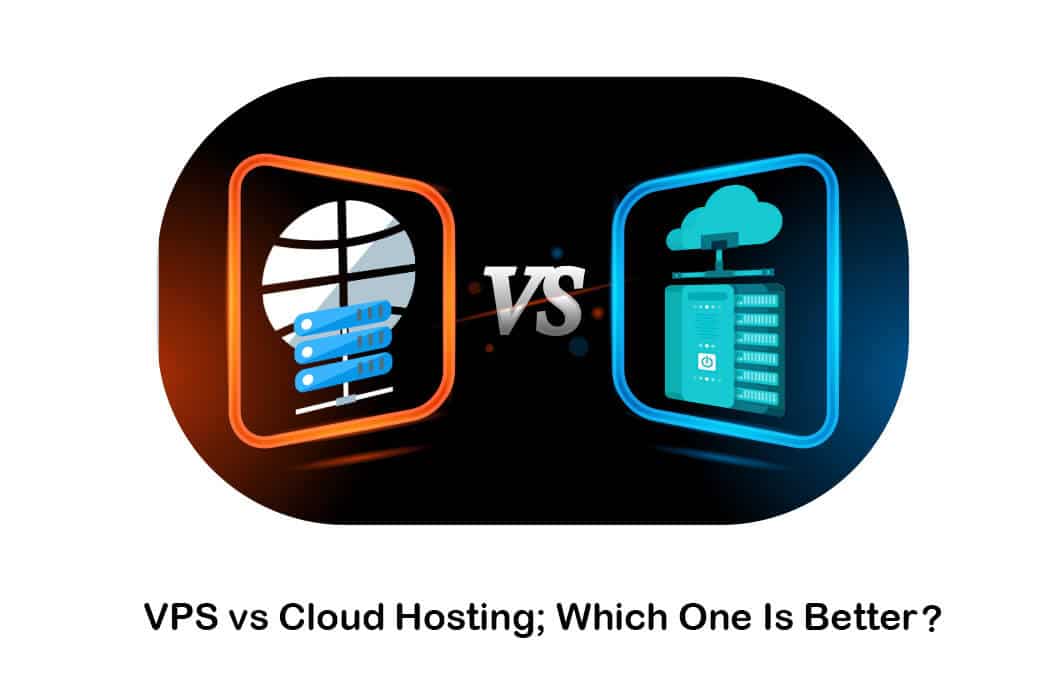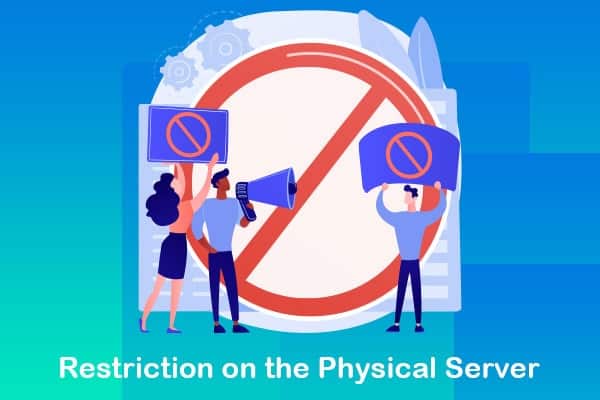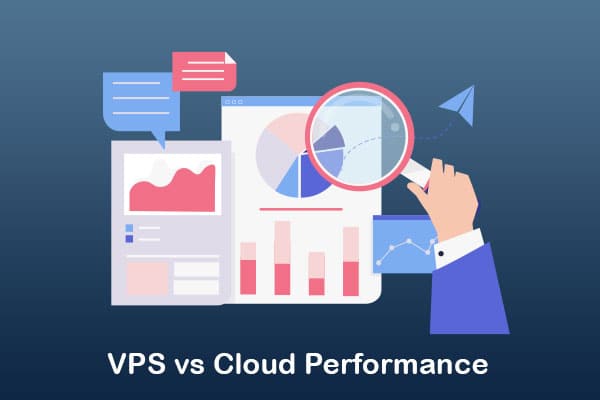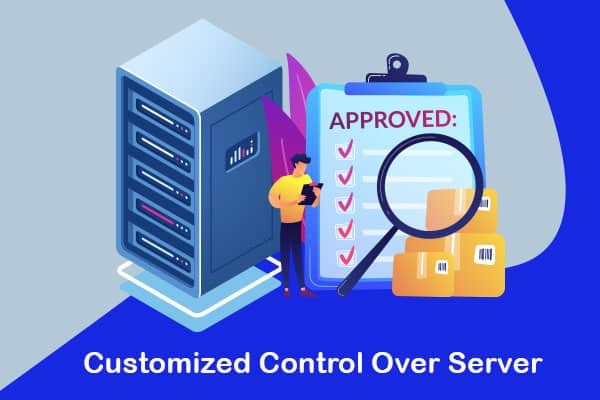Difference Between VPS vs Cloud Hosting; What Is the Difference Between VPS and Cloud Hosting

Table of Contents
What is the difference between VPS and Cloud hosting? There are slight variations between VPS vs cloud hosting, but knowing them can make a huge difference in how you handle and communicate with your website.
When you start creating your website, you are faced with a never-ending maze of options, each of which makes a massive difference in the performance and success of your website. It is easy to linger at any crossroads, obsessing about the path to take and why.
In this article, we will clarify the difference between cloud hosting vs VPS in detail. The choice between virtual private servers vs cloud hosting is the same. You will discover the features of these plans and any drawbacks when you read this post, and you will be able to adapt them to your situation.
There is much to cover, so let’s dive in!
If you want to know more about web hosting vs cloud hosting , click the link provided!
What Is the Difference Between VPS and Cloud Hosting?
You should first know their definition, pros, and cons to better decide between these two hosting plans. So, we are going to identify them in the following section.
What Is VPS Hosting?
VPS Hosting (Virtual Private Servers), sometimes called “Private Cloud,” is based on servers created using the virtualization mechanism.
A VPS runs its copy of an operating system (OS), which enables customers to have super user-level access to that specific operating system. Hence they can install almost any software that runs on that OS.
The architecture of these servers is one with several individual dedicated slots on the same virtual machine. One can assign each slot to dedicated resources. Nevertheless, the system usually operates on a time-shared or resource-shared process.
Some of the main drawbacks that are preventing the VPS hosting industry from hitting the next stage is its instability, which can cause a specific slot or resource to collapse in any crash scenario, and the application or website on that particular space will be inaccessible with no redundant online access unless and up to the time, the issue is resolved.

However, the rest of the applications on various slots will run without any service disruption.
But as all the resources belong to the same machine, there remains a possibility, although in exceptional cases where major trouble hitting a certain slot, such as unexpected redundant traffic on a random day or a DDoS (Distributed Denial of Service) attack, may cause the entire device and subsequent applications to go down.
However, VPS hosting offers some useful points, as it lessens the gap between dedicated and shared hosting solutions.
Suggest you read our article about how does a vps work
cloud vps vs normal vps
We should consider all the features when discussing which is better (Cloud VPS vs VPS).
The best feature of Cloud VPS relies on scalability; It means Cloud VPS doesn’t need any processor or Ram.
Advantages of VPS Hosting
1- Extremely Customizable
A VPS can be an excellent option for website users who have outgrown their shared hosting plan. However, this approach is only useful for some websites out there.
2- Root Access
The common issue you would have to deal with if you didn’t use a VPS is the need for access to your root environment.
Access to the root environment is necessary for you to rely on software packages the hosting provider supports. It’s important to mention that unsupported software can raise security concerns for hosting provider parties; hence, the host will dictate every available software on a shared server.

According to the facts, if your business necessitates a specific software that the host does not support, this server could cause issues. Nevertheless, using a VPS allows you to implement any software changes within the server freely.
For reading our guide ” cloud computing for beginners “, check this article out!
3- Performance
VPS also performs well because a certain amount of server resources are guaranteed. However, you are likely constrained by the physical machine. Moreover, there is a risk that your performance may be influenced by other sites using the same physical system or when you press up against the limit of your plan limits.

4- Scalability
If you own a small business and do not intend to expand it, you would not need to worry about the traffic your website will receive.
On the other hand, if you have plans to grow your business, you’ll experience a rise in website traffic as the customer base expands; therefore, you will need a server to accommodate this. a VPS can make it much easier to scale up operations without interfering with the server’s functioning.
If you want to know more about top cloud hosting , click the provided link!

5- Better Customer Service
Encountering a problem with hosting servers can make a stressful situation to handle, as the livelihood of your business depends on these servers. If you choose to use VPS, you will benefit from a dedicated customer service representative who can help you resolve any problems and offer recommendations that can help you manage your business.
To figure out what is an application server used for , don’t miss this article!

6- Security as a Service
One of the VPS server vs Cloud compute differences is Securing a cloud base has become one if not the most important concerns for all digital industries. Security operations are normally built into the cloud service provider’s architecture from the ground up; therefore, virtual private servers can be inherently safe. The overriding infrastructure that hosts VPS servers is entirely secure as it is subject to ongoing security upgrade initiatives, making VPS the best secure cloud server option.

7- Single-Tenancy
Single-tenant hosting, also called dedicated hosting, is a kind of infrastructure dedicated to a single client. Single-tenant hosting is like a family home and a sanctuary to a single family where no other people are allowed.
According to these facts, on VPS servers, your hosting instance is isolated from other instances on the same parent server, giving you more space to customize your software. This also can ensure more security as exposures to vulnerabilities and penetration attacks are isolated to a single client, and other clients won’t suffer the same fate.

8- Easy Backups
Another benefit of VPS hosting is that it can make automated backups easier than anyone could imagine; all you need to do is to point and click. Scheduling backups, maintaining multiple backups, and restoring them all from scratch is fast, simple, and easy to comprehend, ensuring that even in the worst-case scenarios, your data will be protected.

9- Automated and Fast Deployment
It’s important to mention that manual deployments are error-prone, and it’s easy because it involves humans doing stuff, as Murphy’s Law clearly states: “if anything can go wrong, it will go wrong”. Important operation steps can go wrong or, even worse, be missed. Fortunately, in automated deployments, once the operation is configured, the process will be set and the same every time a release is initiated.
If you want to know the difference between wordpress hosting vs web hosting , don’t miss this article!

10- VPS Is Unbelievably Safe
VPS hosting is less reliable than dedicated hosting but does knock shared hosting out of the park. Your VPS will run independently of other websites using the same physical server. Still, there is a risk that the poor security of another website could easily affect yours.

Now that we know everything there is about VPS hosting, before reading about VPS vs cloud hosting, let’s move on to reading about cloud hosting.
If you are willing to know about benefits of vps hosting , don’t miss this post!
Disadvantages of VPS
Despite all of VPS’s numerous advantages, it does have some drawbacks. Below you can read about some of the main disadvantages of VPS hosting.
Limited Configurations
VPS hosting is much more difficult to set up and handle than shared hosting servers. Many of the software and services should be manually configured, which can be daunting for beginners and requires more technical experience.
If you want to know the best hosting sites for wordpress , don’t miss this post!
1- Restriction on the Physical Server
There can be multiple VPS servers at a time on a physical server. Should one of these servers consume too much CPU or RAM power, it can slow down the entire server. Also, it will affect your VPS container, even if you are not connected with the other servers. Several software limitations were specifically designed to solve this problem but be aware that everything is possible, and this problem can result in crashing the entire server.

2- Lack of Dominant Control
VPS users need complete control over their environment, which sometimes makes it challenging.

3- VPS Is Not The Most Scalable Solution
A certain amount of server resources are guaranteed in VPS hosting, but it will take a lot of work to scale the site quickly, and your current hosting plan will only be able to manage traffic spikes, depending on the volume.
If you want to know more about crawl stats google search console , don’t miss this post!

What is Cloud Hosting?
The biggest difference between cloud server and VPS is that cloud hosting uses many different physical servers rather than a single physical server segment.
| Cloud | VPS | |
| Choose Specific Resources | ✓ | X |
| Instant Provisioning | ✓ | X |
| Live Scaling | ✓ | X |
| High Availability | ✓ | X |
| Handles Enterprise Traffic | ✓ | X |
| Pay As You Use | ✓ | X |
That means you are going to draw resources and process power from physical servers all over the world. You will have access to virtually unlimited resources, and the risk of slower speeds does not exist.
The enormous benefit of cloud storage is that, when you encounter traffic spikes, it gives you more versatility and guarantees efficiency. Instead of confining yourself to the restrictions of one server, you can tap on more server resources whenever you need them. There also exists no chance that the website will go down if one physical server fails since another server will immediately step in to take its place.
in low cost cloud storage article we tells you all about lowest cost cloud storage.

That being said, cloud hosting does not provide as many configuration options as VPS hosting— even if your host requires you to customize, you would usually need much more technical expertise to configure a cloud-based server.
Hosting companies are increasingly providing the best cloud hosting services at competitive rates. These services include Cloud VPS— a VPS hosting option that has all the cloud hosting add-on benefits. This makes it one of the best choices for larger businesses needing flexibility and dependability.
Advantages and Disadvantages of Cloud Hosting
Cloud hosting is a great choice for website owners who want high-capacity and scalable hosts with distinguished performance behind them. Cloud hosting has many advantages, but it could be better for some website styles, as shown below. Read the Advantages and disadvantages of cloud hosting to choose the best one for your website.
Suggest you read our article about cloud hosting advantages

Customization Choices
The best Cloud hosting services offer good customization choices to their users. But, you can be constrained due to the sheer number of servers you need to spread the settings over. Setting up your hosting system to get the most out of your network requires some technical skills.

Ability to Scale
Cloud storage is truly shining in its scalability capabilities. You will have a whole network of servers to tap into at the time of need for supplementary storage or to meet rising traffic needs.
You will also get very high uptime and great performance due to the high server availability. When a physical server malfunctions, the domain is moved to another server.

Very High Security
The best cloud hosting environments will also be very secure and will be separated from other users on the same physical server network. Although since your host is completely web-based, this makes it more vulnerable to attacks.
If you are interested in making an asp net hosting comparison , this post can help you!

VPS Hosting VS Cloud Hosting
Cloud hosting vs VPS hosting; Together, we read about the definitions of the best cloud hosting and VPS hosting and became familiar with their advantages and disadvantages. Now, in this section, we can discuss cloud server vs VPS and review how each performs based on certain benchmarks.
Suggest you read our article about virtual private server vs dedicated server
1. VPS vs Cloud Performance
If you move your website out of a shared hosting plan, the performance is one of the biggest differences you will notice with both Cloud and VPS hosting.
The speed, stability, and reliability you will have with both types of hosting are far superior to that of shared hosting. There are, however, some differences between the two in performance levels.
If you are interested to know the shared hosting meaning , this post can help you!

VPS Hosting
When it comes to comparing cloud hosting vs VPS speed, we can say that with VPS hosting, you are assured of sharing the server space with other websites, and the page loading speeds would be quicker than with shared hosting.
Yet VPS hosting is restricted as the website is still hosted on a physical server — even though you have a separate partition of your own. This way, your VPS is also constrained by physical storage resources and hardware.
Cloud Hosting
Cloud Hosting pulls on many servers worldwide to offer excellent performance levels. Also, cloud computing can provide the same speed and reliability during high-demand periods. Additionally, drawing RAM (memory) and CPU power from various servers give it a remarkable capacity to manage even the most unpredictable surges in traffic.
Plus, due to its ability to transfer files and operating obligations to another server if one fails, the best cloud hosting services are also secured against downtime.
The Winner: Cloud Hosting
2. Scalability As You Expand Your Website with vps or cloud hosting
A scalable hosting service is a requirement for most businesses and website owners. When you are looking for the right hosting solution for your needs, consider how easy it would be to scale up with the hosting company. Do more than just take a look at what you need now. Consider the scalability differences between virtual server vs cloud hosting and prepare for the future.

VPS Hosting
Even though VPS may offer more server resources than shared hosting can, its scalability is limited by the physical server hosting your service. You can increase your virtual server’s memory and processing power, but these numbers are still fixed. The physical server has certain resources that it can deliver.
You will need to move to a new plan to scale up your VPS hosting beyond the limits of the physical server.
Cloud Hosting
Cloud hosting is not restricted to a single physical server and has unlimited scalability options. When your company expands, your cloud hosting is growing along with you, providing higher bandwidth, storage, memory, and processing power rates.
With the best Cloud hosting services, you can quickly scale up your hosting plan to cope with the extra traffic if you need more bandwidth and other services.
The Winner: Cloud Hosting
3. Customized Control: Your Website, Your Rules(cloud vs VPS)
As your business grows, the ability to customize your server setup gets more important. In that respect, VPS and Cloud hosting has significant advantages over shared hosting- where you have no control over your setup.
If you want to compare web hosting control panels , this post can help you!

VPS Hosting
VPS hosting lets you reach a level of customizability close to a dedicated server. Full root access means you can control all aspects of your VPS setup, including the operating system ( usually Linux or Windows).
Cloud Hosting
You do get a degree of customizability from cloud hosting. For instance, you could configure firewalls, change the network architecture, and enforce load balancing. However, because your hosting is built on a vast server network, your hosting company must limit your control over certain settings to ensure your cloud hosting works effectively.
The Winner: VPS hosting
4. Safety and Security: Protection Against Attacks (VPS vs cloud)
Security considerations are, of course, relevant when you are running a business. You need to be sufficiently covered, hacking, DDoS attacks, and malware infections can devastate your bottom line. Not only do various forms of hosting consider various security concerns, but you will also have varying rates of security controls with different providers.
Suggest you read our article about what is gdpr

VPS Hosting
VPS hosting provides you with a high degree of security – equivalent to a server’s. As each VPS on the same physical server is different from others, the website will not be affected even when another website on the server is hacked. Moreover, hosting a single physical server means security is even tighter than accessing cloud hosting.
However, you should be mindful that if another website on your server is hit with a DDoS attack, the physical server can still be incapacitated if the attack is big enough.
You are also responsible for your security customizations and installations on a VPS hosting. So your protection level depends on your actions to keep your VPS hosting safe.
Cloud Hosting
Security levels of cloud hosting are fairly high since the website is kept apart from others. You can bring your security controls in addition to those that your hosting company is providing. Nevertheless, the principal drawback of cloud-based hosting is the complexity of the setup.
Your hosting is distributed over various physical servers, keeping your website secure and easier. As with all web-based services, there are vulnerabilities: cloud hosting is more likely to suffer from malicious attacks.
The Winner: VPS hosting
5. Cost Concerns: Cost-effectiveness and value for money compared to cloud vs VPS
VPS or cloud hosting is far more affordable than dedicated servers and, at the same time, provides many of its advantages. These two options mean you will have greater access to secure, high-performance hosting and great value for money.
Suggest you read our article about 11 best windows vps and cloud virtual server hosting platform

VPS Hosting
VPS hosting is cheaper and offers better value for money than a dedicated server and provides a consistent monthly rate. Every month you choose your plan and get the number of resources promised. VPS hosting rates vary based on several factors, such as resource caps, server specifications, and the support level you need.
Both Cloud and VPS are one step ahead of the performance and features of shared hosting, so you can expect to pay more than essential apps a provider offers.
But both are less expensive than a dedicated server (sometimes costly). Regardless of the provider, these programs are almost always at an average price between shared and dedicated hosting.
Cloud Hosting
Cloud hosting is more costly than VPS hosting due to its limitless storage and excellent scalability. However, it is still great value for money and is usually much more affordable than a dedicated server.
Due to the scalability options, the monthly costs of cloud hosting are less predictable than VPS hosting. For example, your monthly costs will be higher than normal if you encounter traffic spikes. However, you may pay less if your traffic is lower than average.
But whether cloud computing or VPS is more expensive depends on the details. Choosing a cloud application will cost less than a VPS if you use HostGator. Cloud hosting costs more than VPS hosting with several other providers, which makes it difficult to determine this category.
If you are interested to know what is nginx and what is it used for , don’t miss this post!
When comparing the cost of a particular cloud application with a specific VPS, be sure to consider the details. In some cases, cloud hosting plans offer a payment model for what you use, so you may pay more than you expect based on the amount of traffic you receive in a month.
Consider the details when comparing the cost of a particular cloud application with a specific VPS. In some cases, Cloud hosting plans offer a payment model for what you use, so you may pay more than you expect based on the amount of traffic you receive in a month.
Who Should Use VPS Hosting?
A VPS server is a proper choice for almost any kind of situation. Nevertheless, some use cases can make a VPS the best choice.
1- Dealing With a Limited Budget

2- You Have Several Apps with VPS

3- Worried About Data Security with Virtual Private Server

Read this article to figure out how to fix the https not secure message in chrome
4- You Need To Be Online 24/7

An app that is made for customer services must be around the clock. Availability is a crucial factor for a certain type of app. e-commerce apps, for instance, in this case, you will lose your buyer if you are offline, or messenger apps in which your only goal is to connect people 24/7, the list can go on with more examples, but the point has been made. If delivering around-the-clock service to your clients is vital, your best option is a virtual private server. If your server loses connection, your VPS provider will immediately connect you to another server.
The Winner: Well, in terms of price, there is no definite winner. VPS hosting is less expensive but provides less scalability. On the other hand, cloud computing costs are higher, but the value for money makes it worth the extra costs.
Who Should Use Cloud Hosting?
Cloud hosting might be challenging for some kinds of businesses. Depending on your plans to expand your site, consider using cloud hosting in some situations. For instance, let’s say you’ll be running a huge sales promotion and expecting your website traffic to surge 4x during the event. You’ll need a hosting environment to handle this without your site going offline. Below we will discuss situations that will require cloud hosting:
1- Regulated Businesses with Cloud Hosting

Use cases: Healthcare and financial organizations. Healthcare organizations need to be more adaptive to cope with shifting industry regulations. Private or hybrid cloud adoption enables the medical staff to have flexible administration and instant access to client records, making their job much easier.
2- Businesses With Remote Staff or Multiple Locations

Use cases: Global workforces, remote teams Businesses must pay for physical space to house the machines, communication, and hardware. A practical cloud server can make document-sharing between multiple workplaces in a huge industry manageable. Using cloud-based solutions can make it much easier for the staff to access tools and information from different and remote workplaces worldwide.
3- Analytical Businesses

Use cases: Marketing groups, sales teams
Cloud servers can be useful for marketers as they allow data congestion from several sources, such as web and social platforms, without latency or a burdensome financial overhead.
4- Businesses That Require Flexibility

Use cases: Tech startups, corporations large industries face uncertainties with shrinking and expanding business cycles, and continual industry “disruption” requires them to stay in order and be flexible to thrive and expand. Cloud hosting grants that kind of flexibility.
If you are interested to know cloud computing simple definition , don’t miss this post!
Frequently Asked Questions
What Is Better VPS or Cloud?
Cloud hosting is more expensive than VPS hosting as it has more resources and scalability. When predicting expenditures for VPS, you have no clear vision since it is not scalable. But in comparison with the dedicated server, cloud hosting is much more affordable.
When to Switch Between VPS Hosting and Cloud Hosting?
Regarding VPS vs cloud servers, you need to know that both options have advantages, but be aware that what suits one may not be ideal for another.
If you are running a new business and expect to grow with increased traffic in the future, it is best to start with VPS Hosting as it is more cost-efficient.
On the other hand, if you’re a growing business with expansion plans and your server fails to efficiently handle the load and requirements of your incoming online traffic, it is recommended to switch to Cloud Hosting.
Is It Possible to Switch Between VPS and Cloud Hosting?
Absolutely yes; you can start the operation whenever you need to switch to another server. You need to purchase a new hosting plan, transfer your files, change DNS, wait 48 hours for propagation, and, at last, you need to cancel the old plan. You can also request to migrate your content.
Conclusion
Well, according to the difference between cloud hosting and VPS hosting, we answer this question, “What is the difference between VPS and cloud hosting” We saw that cloud hosting seems to be the more decent option. But why is that?
Cloud-based hosting is more stable because when a part of the component goes down, there will be no effect on the performance since the whole idea of it is decentralized hosting.
There is an option in the Cloud to incorporate additional resources if necessary. RAM, disk space, bandwidth, etc., can be added with just a few clicks and dismissed without financial loss if no longer needed. Therefore, cloud hosting can also be described as a web hosting solution offering on-demand services.
It is dynamically scalable and can be customized to suit customer needs. It does not require a big investment; Unnecessary services may be withdrawn without cancelation or any extra fees.






is vps cloud hosting?
is cloud hosting cheaper than vps?
Hello
Not always
It depends on the resources you need